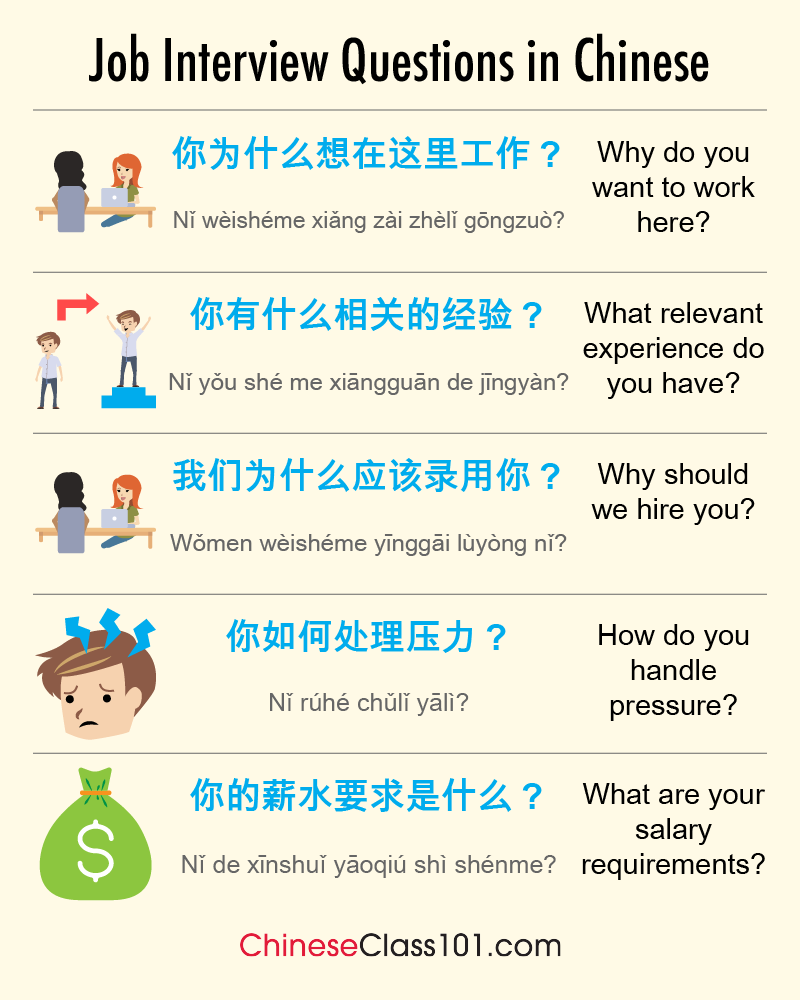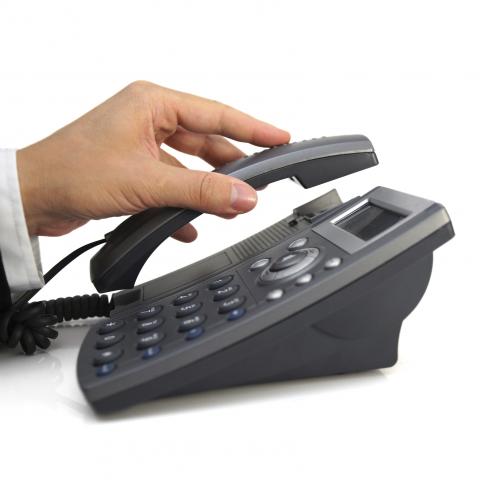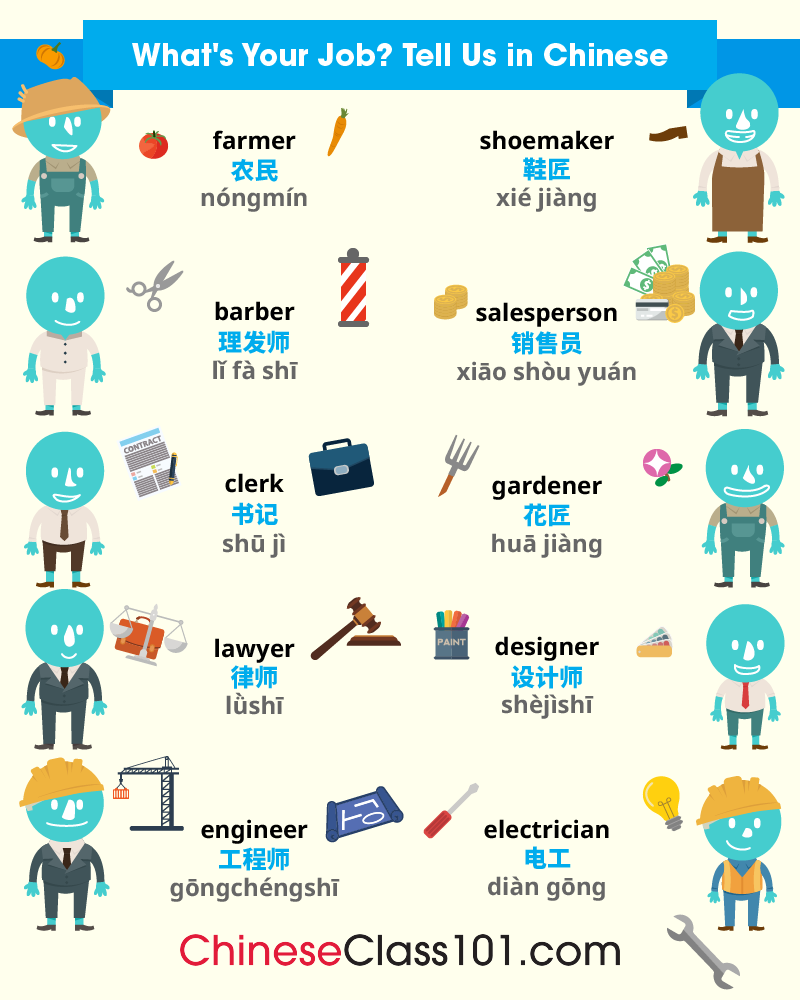
Whether you’re a student seeking the opportunity to live and work in China, an international company employee who has been transferred to the branch office in China, a specialist who deals with clients or partners in China, or simply a Chinese language enthusiast who’s eager to expand your vocabulary, knowing some essential business phrases in Chinese will benefit you professionally, socially, and financially.
In this article, we’ll present you with fifty common Chinese business phrases and patterns (with examples, key vocabulary, and notes) to use in different business circumstances in China. Be it a job interview, a business meeting, or a chat with coworkers and clients, you’ll be prepared to handle it in smooth business Chinese.
Now, let’s get down to business!
 Table of Contents
Table of Contents
- Nail a Job Interview
- Interact with Coworkers
- Sound Smart in a Meeting
- Handle Business Phone Calls and Emails
- Go on a Business Trip
- Learn More on ChineseClass101.com
1. Nail a Job Interview

Going to a job interview well-prepared is your first step toward career success.
Keep in mind that Chinese culture values humbleness and respect toward seniors (those who are older than you or who have more experience). In a job interview, it’s important to show good manners in front of your interviewers and to impress them with solid facts and stats, instead of big, empty words.
Here are some useful Chinese business phrases that will help you find a job in China:
A- Talking About Yourself
The following Chinese phrases for business interviews will help you introduce yourself to your interviewer and tell them about your experience.
1. 您好,我是 ___。/ 我叫 ___。
Pinyin: Nínhǎo, Wǒ shì ___. / Wǒ jiào ___.
Translation: “Hello, I am ___.” / “My name is ___.”
Note:
您 (nín) is a polite form for “you.” It’s recommended to use 您 (nín) to address your interviewer.
2. 这是我的简历。
Pinyin: Zhè shì wǒ de jiǎnlì.
Translation: “This is my resume.”
Key Vocabulary:
- 简历 (jiǎnlì) – “resume”
3. 我有过___的经验。
Pinyin: Wǒ yǒuguò ___ de jīngyàn.
Translation: “I have had the experience of ___.”
Key Vocabulary:
- 经验 (jīngyàn) – “experience”
Example:
我有过电话推销的经验。(Wǒ yǒuguò diànhuà tuīxiāo de jīngyàn.)
“I’ve had the experience of telemarketing.”
4. 我会___。
Pinyin: Wǒ huì ___.
Translation: “I can ___.”
Example:
我会说汉语和德语。(Wǒ huì shuō Hànyǔ hé Déyǔ.)
“I can speak Chinese and German.”
5. 我擅长___。
Pinyin: Wǒ shàncháng ___.
Translation: “I’m good at ___.”
Example:
我擅长制作表格。(Wǒ shàncháng zhìzuò biǎogé.)
“I’m good at making spreadsheets.”
6. 我曾经获得___。
Pinyin: Wǒ céngjīng huòdé ___.
Translation: “I have been awarded ___.”
Key Vocabulary:
- 曾经 (céngjīng) – “once”
- 获得 (huòdé) – “to earn” / “to acquire”
Example:
我曾经获得年度优秀员工的称号。(Wǒ céngjīng huòdé niándù yōuxiù yuángōng de chēnghào.)
“I have been awarded the title of ‘Employee of the Year’.”
B- Polite Phrases
Here are some useful phrases you can use to thank your interviewer, ask questions, and let your interviewer know that you want to keep in touch.
7. 谢谢您给我面试的机会。
Pinyin: Xièxiè nín gěi wǒ miànshì de jīhuì.
Translation: “Thank you for giving me the opportunity to come in for an interview.”
Key Vocabulary:
- 机会 (jīhuì) – “opportunity”
Note:
This phrase can be used at the beginning or the end of the interview.
8. 对不起,能再说一遍吗?
Pinyin: Duìbuqǐ, néng zài shuō yí biàn ma?
Translation: “I’m sorry, could you say it again?”
9. 冒昧地问一下___。
Pinyin: Màomèi de wèn yíxià ___.
br>
Translation: “Excuse me for asking ___.”
Key Vocabulary:
- 冒昧 (màomèi) – “presumptuous”
Example:
冒昧地问一下,这个职位的薪水范畴是多少?(Màomèi de wèn yíxià, zhège zhíwèi de xīnshuǐ fànchóu shì duōshao?)
“Excuse me for asking, but what’s the salary range for this position?”
10. 期待您的答复。
Pinyin: Qīdài nín de dáfù.
Translation: “Look forward to your reply.”
Key Vocabulary:
- 答复 (dáfù) – “reply” / “response”
Note:
This phrase could also be used as an ending phrase in other circumstances, such as in an email.
2. Interact with Coworkers

Even though your Chinese workers are likely to speak English, it’s still a good idea to make an effort to speak Chinese in the office. It will help you build relationships inside the company and learn both professional skills and the Chinese language quickly. Following are some practical business phrases in Chinese for communicating with your coworkers.
A- Asking for Help
11. 能帮我一下吗?
Pinyin: Néng bāng wǒ yíxià ma?
Translation: “Could you give me a hand?”
12. 这个怎么用?
Pinyin: Zhège zěnme yòng?
Translation: “How do I use this?”
13. 您有空教我一下吗?
Pinyin: Nín yǒukòng jiāo wǒ yíxià ma?
Translation: “Do you have time to show me briefly?”
Key Vocabulary:
- 有空 (yǒukòng) – “to have time”
Note:
So far, we have three phrases ending with 一下 (yíxià), which literally means “a bit.” It’s attached to verbs or verb phrases in colloquial language to soften the command or request.
B- Expressing Gratitude and Giving Compliments
14. 太谢谢你了。
Pinyin: Tài xièxie nǐ le.
Translation: “Thank you so much!”
15. 辛苦了。
Pinyin: Xīnkǔ le.
Translation: “Thank you for working hard.”
Note:
This is a common but untranslatable phrase used to express gratitude for someone who is working for you. The literal translation is “It was hard work,” but it could also translate as “Thank you for working hard.”
16. 你太厉害了!
Pinyin: Nǐ tài lìhai le!
Translation: “You’re so good!”
Key Vocabulary:
- 厉害 (lìhai) – “awesome”
17. 我要多向你学习。
Pinyin: Wǒ yào duō xiàng nǐ xuéxí.
Translation: “I need to learn a lot from you.”
C- Socializing After Work

18. 下班后有安排吗?
Pinyin: Xiàbān hòu yǒu ānpái ma?
Translation: “Do you have plans after work?”
Key Vocabulary:
- 安排 (ānpái) – “arrangement”
19. 我请你___。
Pinyin: Wǒ qǐng nǐ ___.
Translation: “I’ll buy you ___.” / “My treat to have ___.”
Example:
我请你喝奶茶。(Wǒ qǐng nǐ hē nǎichá.)
“I’ll buy you milk tea.”
20. 我可以搭你的顺风车吗?
Pinyin: Wǒ kěyǐ dā nǐ de shùnfēng chē ma?
Translation: “Can I hitch a ride with you?”
Key Vocabulary:
- 顺风车 (shùnfēng chē) – [slang] This is a vehicle that offers a free ride (usually to people the driver knows).
3. Sound Smart in a Meeting

Meetings are an indispensable part of office life. While they’re often perceived as boring or stressful, they can also be your ticket to promotion. Through meetings, opinions and ideas are shared and discussed, which gives you opportunities to show your talent, hard work, and dedication.
In conjunction with proper Chinese business meeting etiquette, the following phrases will help you sound smart in front of your supervisors and clients.
A- Expressing Opinions
Giving your opinion on something is a cornerstone of effective business communication. Here are some useful phrases to help you do so.
21. 我觉得___。
Pinyin: Wǒ juéde ___.
Translation: “I feel/think ___.”
22. 我个人认为___。
Pinyin: Wǒ gèrén rènwéi ___.
Translation: “I personally think/consider ___.”
23. 我同意/不同意这个看法。
Pinyin: Wǒ tóngyì /bù tóngyì zhège kànfǎ.
Translation: “I agree/don’t agree with this view.”
Key Vocabulary:
- 看法 (kànfǎ) – “view” / “opinion”
Making Suggestions
Don’t be afraid to speak up during the business meeting with suggestions!
24. 我建议___。
Pinyin: Wǒ jiànyì ___.
Translation: “I suggest ___.”
25. 要不这样吧___。
Pinyin: Yàobu zhèyàng ba ___.
Translation: “How about this ___.”
Example:
要不这样吧,您先考虑几天。(Yàobu zhèyàng ba, nín xiān kǎolǜ jǐ tiān.)
“How about this, you think about it for a few days.”
B- Making Negotiations
Here are a couple of phrases you’re going to need for Chinese business negotiations.
26. 这个价格我们没办法接受。
Pinyin: Zhège jiàgé wǒmen méi bànfǎ jiēshòu.
Translation: “We can’t accept this price.”
Key Vocabulary:
- 没办法 (méi bànfǎ) – “have no way” / “can’t”
- 接受 (jiēshòu) – “to accept”
27. 如果贵公司愿意___我们就___。
Pinyin: Rúguǒ guì gōngsī yuànyì___wǒmen jiù___.
Translation: “If your company is willing to___we will then___.”
Note:
贵公司 (guì gōngsī) literally means “honorable company,” and it’s an honorific term to refer to the company you’re speaking with.
Key Vocabulary:
- 愿意 (yuànyì) – “willing to”
- 如果……就……(rúguǒ… jiù…) – “if…then…”
C- Giving Presentations
Have you been asked to present in front of your supervisor, coworkers, or clients? The following phrases will help you give a smooth presentation in Chinese.
28. 请看这个图表。
Pinyin: Qǐngkàn zhège túbiǎo.
Translation: “Please look at this chart.”
29. 我来汇报一下上个月的公司业绩。
Pinyin: Wǒ lái huìbào yīxià shàng ge yuè de gōngsī yèji.
Translation: “Let me give a report on the company’s performance last month.”
Key Vocabulary:
- 汇报 (huìbào) – “to report”
- 业绩 (yèji) – “performance”
30. 请各部门配合我们的工作。
Pinyin: Qǐng gè bùmén pèihé wǒmen de gōngzuò.
Translation: “Each department, please cooperate with us.”
Key Vocabulary:
- 部门 (bùmén) – “department”
- 配合 (pèihé) – “to cooperate”
4. Handle Business Phone Calls and Emails

Impress your clients and colleagues by using the following phrases when making phone calls and writing emails.
A- Phone Phrases
31. 你好,我是___ / 这里是___。
Pinyin: Nǐhǎo, wǒ shì ___ / zhèli shì ___.
Translation: “Hello, this/here is ___.”
Note:
Use your name or title after 我是 (wǒ shì), meaning “I am.” Use your office name after 这里是 (zhèli shì), meaning “here is.”
32. 您好,请问是___吗?
Pinyin: Nínhǎo, qǐngwèn shì ___ma?
Translation: “Hello, may I ask if this is ___?”
Key Vocabulary:
- 请问 (qǐngwèn) – “May I please ask…”
33. ___在吗?
Pinyin: ___zài ma?
Translation: “Is ___ here?”
Example:
刘主管在吗?(Liú Zhǔguǎn zài ma?)
“Is Director Liu here?”
34. 我是。有什么可以帮你的吗?
Pinyin: Wǒ shì. Yǒu shénme kěyǐ bāng nǐ de ma?
Translation: “Speaking. How can I help you?”
35. 好的,没问题。
Pinyin: Hǎo de, méi wèntí.
Translation: “Okay, no problem.”
36. 我们___见。
Pinyin: Wǒmen___jiàn.
Translation: “See you ___.”
Example:
我们下周一见。(Wǒmen xià zhōuyī jiàn.)
“See you next Monday.”
B- Email Phrases
Here are a few business Chinese email phrases you can use when corresponding with colleagues or clients.
37. 尊敬的 ___
Pinyin: Zūnjìng de ___
Translation: “Honorable ___”
Note:
This polite prefix is used to address someone in formal situations.
38. 请注意查收。
Pinyin: Qǐng zhùyì cháchōu.
Translation: “Please check (your inbox for the above-mentioned subject).”
Note:
This is used to remind someone that an important document has been or will be sent soon, so they should be ready to check their inbox.
39. 如有疑问,请随时和我们联系。
Pinyin: Rú yǒu yíwèn, qǐng suíshí hé wǒmen liánxì.
Translation: “If you have any questions, please contact us any time.”
Key Vocabulary:
随时 (suíshí) – “at any time”
联系 (liánxì) – “to contact”
40. 祝好。
Pinyin: Zhù hǎo.
Translation: “Best regards.”
Note:
This is a simple and generic letter ending that is appropriate in both business and casual settings.
5. Go on a Business Trip

Business trips can be exciting and nerve-racking at the same time. Things will go a lot smoother if you know a few essential Chinese business phrases for the trip, especially if you’re traveling to China with colleagues who don’t speak Chinese and rely on your language skills!
A- Before the Trip
41. 我需要订___。
Pinyin: Wǒ xūyào dìng ___.
strong>Translation: “I need to book ___.”
Example:
我需要订三个大床房。(Wǒ xūyào dìng sān ge dàchuáng fáng.)
“I need to book three queen bedrooms.”
Note:
In China, the most common hotel rooms are:
- 双床房 (shuāngchuáng fáng) – “double single beds”
- 大床房 (dàchuáng fáng) – “big bed,” i.e. “queen-size bed”
- 套房 (tàofáng) – “suite”
42. 这是我们的行程单, 请过目。
Pinyin: Zhè shì wǒmen de xíng chéng dān, qǐng guòmù.
Translation: “This is our itinerary, please have a look.”
Note:
过目 (guòmù) literally means “to pass one’s eyes,” and it’s a formal way to ask someone to check something. It’s often used with people of higher social status, such as supervisors and clients.
B- During the Trip
43. 你好,我是___公司的___,很高兴认识你。
Pinyin: Nǐhǎo, wǒ shì ___ gōngsī de ___. Hěn gāoxìng rènshi nǐ.
Translation: “Hello, I’m ___ from ___ company. Nice to meet you.”
44. 这是我的名片。
Pinyin: Zhè shì wǒ de míngpiàn.
Translation: “This is my business card.”
Key Vocabulary:
- 名片 (míngpiàn) – “business card”
45. 谢谢你们送我们回酒店。
Pinyin: Xièxie nǐmen sòng wǒmen huí jiǔdiàn.
Translation: “Thank you for driving us back to our hotel.”
46. 你好,我有预订,名字是___。
Pinyin: Nǐhǎo, wǒ yǒu yùdìng, míngzi shì ___.
Translation: “Hello, I have a reservation under the name ___.”
Key Vocabulary:
- 预订 (yùdìng) – “reservation”
47. 明天的会议几点开始?
Pinyin: Míngtiān de huìyì jǐdiǎn kāishǐ?
Translation: “When does tomorrow’s meeting start?”
Key Vocabulary:
- 会议 (huìyì) – “meeting” / “conference”
- 几点 (jǐdiǎn) – “(lit.) what o’clock” / “what time”
48. 附近有可以游览的地方吗?
Pinyin: Fùjìn yǒu kěyǐ yóulǎn de dìfang ma?
Translation: “Are there any places that we could tour around in this area?”
Key Vocabulary:
- 附近 (fùjìn) – “nearby”
- 游览 (yóulǎn) – “to tour” / “to go sightseeing”
C- At the End of the Trip
49. 感谢各位的热情招待。
Pinyin: Gǎnxiè gèwèi de rèqíng zhāodài.
Translation: “Thank you everyone for your hospitality.”
Key Vocabulary:
热情 (rèqíng) – “warm” / “cordial”
招待 (zhāodài) – “hospitality”
50. 我们合作得很愉快,期待下次再见。
Pinyin: Wǒmen hézuò de hěn yúkuài, qīdài xiàcì zàijiàn.
Translation: “It was pleasant working with you, hope to see you again.”
Key Vocabulary:
愉快 (yúkuài) – “pleasant”
期待 (qīdài) – “to look forward to”

6. Learn More on ChineseClass101.com
Did we cover all the business phrases you wanted to learn in this article? If you’d like to learn more, check out our Business Chinese for Beginners lesson series and learn more business phrases with audio, downloadable lesson notes, and question-answering from our certified teachers.
Remember: On ChineseClass101.com, we have weekly updated learning resources in various forms, from flashcards, to vocabulary lists, to podcasts, and even to video lessons. You can choose whatever works for you!
Need to boost your Chinese in a short amount of time for your next business meeting in China? No problem! Check out our Premium PLUS subscription to get customized learning paths and one-on-one instruction from your own personal teacher.
Happy learning!
About the author: Influenced by her grandfather, Yinru has shown interest in languages and teaching since early childhood. After getting her degrees in English and Education, Yinru moved to the US and continued her career as a Mandarin teacher.
Yinru enjoys travelling, photography, and introducing Chinese food to her non-Chinese friends.










